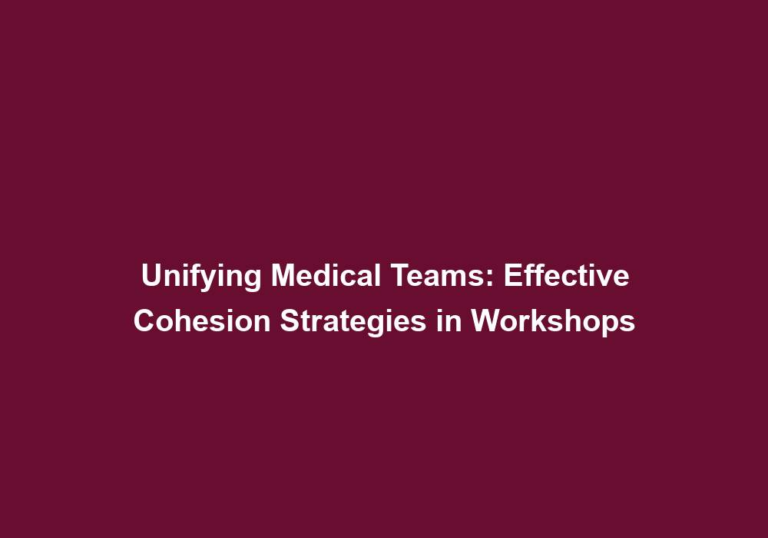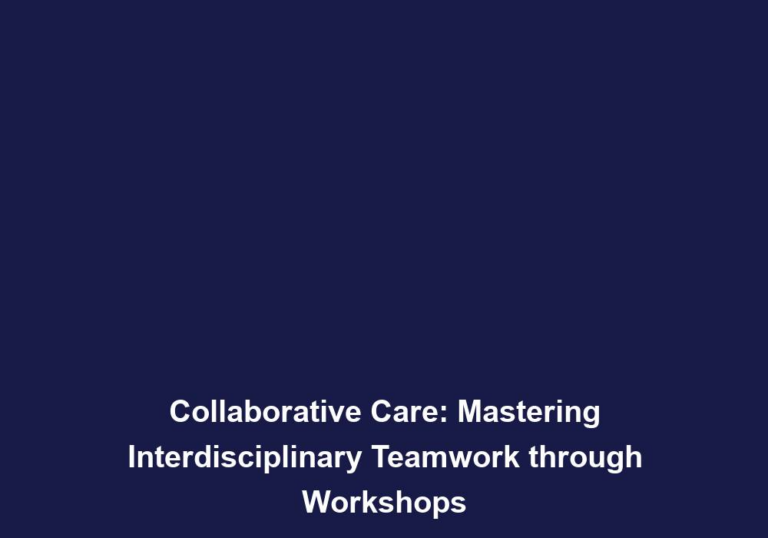Fostering Unity: Strategies for Stronger Team Cohesion in Medical Settings
Team cohesion and unity play a vital role in the success of medical settings. In order to provide high-quality healthcare services, it is crucial for medical teams to work together effectively and efficiently. Strong team cohesion not only improves patient outcomes but also contributes to a positive and supportive work environment. This article explores strategies that can be implemented to foster unity and enhance team cohesion in medical settings.
Benefits of Team Cohesion in Medical Settings
Before diving into strategies for building stronger team cohesion, it is important to understand the benefits it can bring to medical settings. When healthcare professionals work cohesively as a team, the following advantages can be observed:
-
Improved Communication: Strong team cohesion fosters open and effective communication among healthcare professionals. This enables the seamless exchange of information, ideas, and concerns, leading to better coordination of patient care. Effective communication can prevent errors or misunderstandings, ensuring that all team members are on the same page.
-
Enhanced Patient Care: When medical teams work cohesively, patient care is optimized. Collaboration and cooperation between healthcare professionals result in comprehensive and holistic treatment plans, leading to better patient outcomes. By pooling their expertise and perspectives, healthcare professionals can develop well-rounded care plans that address all aspects of a patient’s condition.
-
Increased Job Satisfaction: A cohesive team creates a positive work environment where members feel supported and valued. This boosts morale, job satisfaction, and overall team motivation, leading to increased productivity and lower staff turnover rates. When team members feel appreciated and respected, they are more likely to be engaged in their work and committed to providing the best possible care.
-
Efficient Resource Utilization: Strong team cohesion enables efficient resource utilization within medical settings. By working together, healthcare professionals can optimize the use of available resources, leading to cost-effective and sustainable practices. This includes sharing equipment, coordinating schedules, and leveraging each team member’s strengths to maximize efficiency and minimize waste.
Now that we understand the importance of team cohesion in medical settings, let’s explore strategies that can be implemented to foster unity among healthcare professionals.
1. Encouraging Open and Transparent Communication
Communication lies at the heart of strong team cohesion. To foster unity, it is essential to encourage open and transparent communication among healthcare professionals. Consider the following strategies:
-
Regular Team Meetings: Conduct regular team meetings to discuss patient cases, share updates, and address any concerns. These meetings provide an opportunity for open dialogue, fostering collaboration and shared decision-making. They allow team members to stay informed about each other’s progress and challenges, promoting a sense of unity and shared responsibility.
-
Active Listening: Encourage active listening within the team. Healthcare professionals should be attentive and empathetic while listening to their colleagues’ perspectives and concerns. Active listening helps build trust and understanding, ensuring that everyone’s opinions are valued and considered.
-
Feedback Culture: Establish a culture of giving and receiving constructive feedback. This promotes continuous learning and improvement while strengthening relationships among team members. Feedback should be specific, timely, and focused on finding solutions rather than assigning blame. This creates a supportive environment where everyone is committed to personal and team growth.
2. Building Trust and Respect
Trust and respect are fundamental pillars of team cohesion. When healthcare professionals trust and respect each other, they work together more effectively. Consider the following strategies to build trust and respect within a medical team:
-
Clear Expectations: Set clear expectations and responsibilities for each team member. This promotes accountability and ensures that everyone understands their role within the team. When roles and responsibilities are clearly defined, team members can trust that their colleagues will fulfill their duties competently and reliably.
-
Recognize and Appreciate: Recognize and appreciate the contributions of team members. Acknowledging their efforts and successes boosts morale and strengthens the sense of belonging within the team. This can be done through public recognition, awards, or simple gestures of appreciation, such as a thank-you note or a small token of gratitude.
-
Conflict Resolution: Establish a framework for resolving conflicts within the team. Encourage open discussions and provide mediation if necessary. Resolving conflicts promptly and constructively helps maintain trust and respect among team members. This may involve active listening, compromise, and finding win-win solutions that address everyone’s concerns.
3. Encouraging Collaboration and Interdisciplinary Approach
Collaboration and an interdisciplinary approach are essential for providing comprehensive and patient-centered care. Here are some strategies to encourage collaboration within medical teams:
-
Cross-Training: Encourage healthcare professionals to undergo cross-training, enabling them to understand and appreciate the roles and skills of their colleagues. This promotes teamwork and facilitates seamless transitions when necessary. Cross-training allows team members to step in for one another, ensuring continuity of care and reducing the burden on any single individual.
-
Interprofessional Education: Facilitate interprofessional education programs where healthcare professionals from different disciplines learn together, fostering mutual respect and understanding. This can include workshops, seminars, or joint training sessions. Interprofessional education helps break down professional silos and encourages collaboration by promoting a shared understanding of each other’s expertise.
-
Case Conferences: Organize regular case conferences where team members from different specialties discuss complex cases and formulate collaborative treatment plans. This interdisciplinary approach leads to comprehensive care and improved patient outcomes. Case conferences provide a platform for interdisciplinary collaboration, allowing team members to contribute their unique perspectives and knowledge to develop the best possible care plan.
4. Promoting a Supportive Work Environment
Creating a supportive work environment is crucial for team cohesion. When healthcare professionals feel supported, they are more engaged and committed to their work. Consider the following strategies to promote a supportive work environment:
-
Mentorship Programs: Establish mentorship programs where experienced healthcare professionals guide and support their junior colleagues. This fosters professional growth and creates a sense of community within the team. Mentors can provide guidance, share their expertise, and offer emotional support to help new team members navigate their roles and responsibilities.
-
Work-Life Balance: Encourage a healthy work-life balance by promoting flexible schedules and providing resources for stress management. This supports the well-being of team members and prevents burnout. Offering flexible work arrangements, such as part-time options or remote work opportunities, can help healthcare professionals achieve a better balance between their personal and professional lives.
-
Celebrating Success: Celebrate team achievements and milestones. Recognize the collective efforts of the team and celebrate successes together. This boosts team morale and reinforces a sense of unity and accomplishment. Celebrations can take various forms, such as team outings, social events, or even simple acknowledgments during team meetings. The key is to create a culture of celebration and appreciation.
In conclusion, fostering unity and strengthening team cohesion in medical settings is vital for the delivery of high-quality healthcare. By implementing strategies such as encouraging open communication, building trust and respect, promoting collaboration, and creating a supportive work environment, healthcare professionals can work together more effectively, leading to improved patient care and overall team satisfaction.
Note: The article above is written in markdown format.







